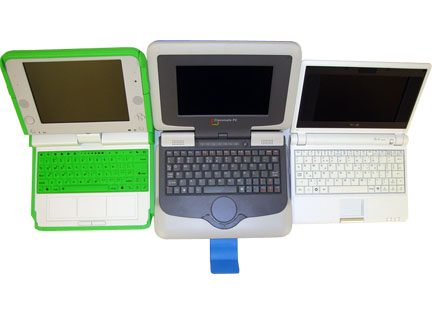Information communication technologies (ICTs) are increasingly considered valuable tools in education, promoting higher cognitive processes and allowing teachers and learners access to a wealth of information. However, these technologies are not easily accessible in developing countries such as South Africa, where a large percentage of the population are poor and are said to live below the breadline.
The recent creation of small, low cost and low powered laptops called netbooks, are seen as possible solutions to allow or promote the use and integration of ICTs in education in these disadvantaged communities.

The aim of the project, The OLPC XO, Intel Classmate PC and Asus Eee PC user study, is to evaluate the suitability and intuitiveness of netbooks in the educational context of the disadvantaged children. An evaluation and comparison will be made between the OLPC XO, Asus Eee PC and Intel ClassmatePC at a literature review level, and in the context of secondary school education through the use of a user study. The user study involved three teachers and three learners from local secondary schools in Grahamstown, South Africa.
Results - ClassmatePC
The results of the user study revealed that the teachers and learners (on the whole) felt that the Intel Classmate is the most intuitive netbook for secondary school learners involved in the user study.
Results - EeePC
The presence of the VGA port and the portable nature of the Asus Eee were noted by participants as advantageous. The Asus Eee was also found to be appropriate for secondary school education although it was criticised for its small screen, small keyboard and absence of a webcam.
Results - OLPC
Participants felt that the OLPC XO is less intuitive for secondary school educational purposes and is better suited for small children. They felt that this netbook is better suited for small children. None of the participants were interested in buying this netbook and the teachers did not recommend the learners buy it.
Some difficulties expressed by users were that the cursor got "stuck" and participants found it difficult to familiarise themselves with the operating system interface. The first impression of the participants when they saw the OLPC was that it was a children's toy and they were reluctant to use it.
Arguably, this recommendation would extend to the South African Department of Education with regards to secondary school learners.
Constance Sibanda is a student in the Computer Science Department at Rhodes University, Grahamstown, South Africa


The 6 (six!) study subjects I think are relevant here:
"Teacher A is a grade 11 and 12 accounting teacher at school A with 5 years of teaching experience [...] knows how to use both laptops and desktop computers. He uses a computer every day [...] Learner A is a grade 12 learner from school A, she is doing science subjects including mathematics, biology, accounting and physics. [...] was familiar with both laptops and desktop computers and uses a computer at least once a day. [...] could only use the Windows XP operating system.
Teacher B is a grade 10 and 11 business studies teacher at school B. She has 10 years of teaching experience and [...] uses a computer once a week on average and [...] she had only used a desktop computer. [...] Learner B is a grade 11 learner at School B and is doing science based subjects including physics and mathematics. [...] he had only used desktop computers prior to this project.
Teacher C, from school C, has more than 25 years of teaching experience and teaches geography. [...] knew how to use both laptops and desktop computers. She uses a computer at least once a day. [...] Learner C is a grade 11 learner at school C and is also doing mostly science based subjects including physics and mathematics. [...] knew how to use both desktop and laptop computers.[...] used computers once a month on average."